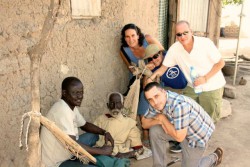- Home » Expat Articles » Interviews » American Expat Living in Mali - Interview with Jeff
American Expat Living in Mali - Interview with Jeff
| Published: | 20 Jun at 9 AM |
Want to get involved?
Become a Featured Expat and take our interview.
Become a Local Expert and contribute articles.
Get in touch today!
Become a Local Expert and contribute articles.
Get in touch today!
Filed: Interviews,Mali
Jeff grew up next to a cornfield in a small town in Illinois watching the PBS show "Big Blue Marble" that highlighted the lives of kids around the globe. He vowed that one day he would see the world beyond the cornfield next door. So, at 16 he was an exchange student in Peru, at 20 he backpacked through Europe and Egypt, and he continues to see the globe as a teacher in an international school. He now lives across the street from a carrot field in Bamako, Mali, West Africa. Jeff's expat blog is called 2seetheglobe (see listing here)
Where are you originally from?
I'm from a small town called Quincy, Illinois, on the mighty Mississippi, just upriver from Tom Sawyer and Huckleberry Finn's stomping grounds.
In which country and city are you living now?
I currently live in Bamako, the capital city of Mali in West Africa.
How long have you lived in Mali and how long are you planning to stay?
I've lived and taught here for nearly two years, and just recently extended my teaching contract for a third year.
Why did you move to Mali and what do you do?
I moved to Mali to teach 4th/5th grade in at the American International School of Bamako (AISB), dismayed with the sorry state of education in the U.S. and also looking for adventure. I need more out of life than Starbucks coffee and mall shopping.
Did you bring family with you?
My partner Jamey and I were hired together. He teaches chemistry, physics, biology, and environmental science.
How did you find the transition to living in a foreign country?
We transitioned swimmingly. I've lived abroad twice in Peru and Germany, and Jamey and I have travelled to nearly 50 countries, so this wasn't our first rodeo. Plus we came with realistic expectations and good attitudes--we never come to a place expecting it to be just like home.
Was it easy making friends and meeting people; do you mainly socialise with other expats?
At school we have an interesting group of colleagues with fascinating backgrounds. Since we are affiliated with the U.S. Embassy we also have friends that work there. We are also involved in a theatre group of expats which widened our social circle.
What are the best things to do in the area; anything to recommend to future expats?
Malian music is known and appreciated all over the world, so attending a concert here is a must-do. The outdoor markets are massively chaotic but an absolute adventure you can't miss. You must also travel a bit outside of the city where you can hike, rock climb, stand under a waterfall, and visit tiny villages that make it seem you've gone back in time. The French bakeries are killer too.
What do you enjoy most about living in Mali?
Malians are gracious, respectful, and joyful, and they made us feel welcome from day one. Their culture is rich in the arts and we love their music, dance, theatre, and visual arts. Unlike the chaos back home, life is simple and uncomplicated here for us.
How does the cost of living in Mali compare to home?
There are extremes. It costs about $175/month for a full-time maid, but a basic dinner out for two at a casual restaurant can run $60. A bag of fruits/vegetables from the outdoor market can cost a couple of dollars; a bag of Lays potato chips at the grocery store costs $10.
What negatives, if any, are there to living in Mali?
Well, a month after we signed out contract in 2012 the government was overthrown in a coup. Then there was a counter-coup. Then an intervention by the French army to oust Islamists who had overtaken towns in the north and implemented Sharia Law. Aside from that, things have been peachy. But seriously, Mali is back on track again, although there are still problems in the north. And while it can get hot for a few months out of the year (melt-your-face hot), and the dust is everywhere, and the traffic is a bit crazy (motos, cars, donkeys, trucks, cattle) it's a fascinating place to experience. Everyday is an adventure.
If you could pick one piece of advice to anyone moving to Mali, what would it be?
When it's 106 degrees, sip on a ice cold gin and tonic with a wedge from a local lime and watch the Niger river pass by.
What has been the hardest aspect to your expat experience so far?
The aforementioned coup negatively affected life in Bamako and certainly at our school where more than half of our students and their families left in the aftermath. The future of our school was uncertain for a time. But now that Mali is back on its feet with a new democratically-elected government in place, everyday life is back to normal and or school is thriving.
When you finally return home, how do you think you'll cope with repatriation?
No plans to return to the U.S. yet....
What are your top 5 expat tips for anyone following in your footsteps?
My blog is an unconventional and humorous peek at life for two American guys in a developing country in West Africa. I want to make you laugh while expanding your world view.
How can you be contacted for further advice to future expats coming to your area?
I can be contacted through my blog.
Here's the interview with Jeff...
Where are you originally from?
I'm from a small town called Quincy, Illinois, on the mighty Mississippi, just upriver from Tom Sawyer and Huckleberry Finn's stomping grounds.
In which country and city are you living now?
I currently live in Bamako, the capital city of Mali in West Africa.
How long have you lived in Mali and how long are you planning to stay?
I've lived and taught here for nearly two years, and just recently extended my teaching contract for a third year.
Why did you move to Mali and what do you do?
I moved to Mali to teach 4th/5th grade in at the American International School of Bamako (AISB), dismayed with the sorry state of education in the U.S. and also looking for adventure. I need more out of life than Starbucks coffee and mall shopping.
Did you bring family with you?
My partner Jamey and I were hired together. He teaches chemistry, physics, biology, and environmental science.
How did you find the transition to living in a foreign country?
We transitioned swimmingly. I've lived abroad twice in Peru and Germany, and Jamey and I have travelled to nearly 50 countries, so this wasn't our first rodeo. Plus we came with realistic expectations and good attitudes--we never come to a place expecting it to be just like home.
Was it easy making friends and meeting people; do you mainly socialise with other expats?
At school we have an interesting group of colleagues with fascinating backgrounds. Since we are affiliated with the U.S. Embassy we also have friends that work there. We are also involved in a theatre group of expats which widened our social circle.
What are the best things to do in the area; anything to recommend to future expats?
Malian music is known and appreciated all over the world, so attending a concert here is a must-do. The outdoor markets are massively chaotic but an absolute adventure you can't miss. You must also travel a bit outside of the city where you can hike, rock climb, stand under a waterfall, and visit tiny villages that make it seem you've gone back in time. The French bakeries are killer too.
What do you enjoy most about living in Mali?
Malians are gracious, respectful, and joyful, and they made us feel welcome from day one. Their culture is rich in the arts and we love their music, dance, theatre, and visual arts. Unlike the chaos back home, life is simple and uncomplicated here for us.
How does the cost of living in Mali compare to home?
There are extremes. It costs about $175/month for a full-time maid, but a basic dinner out for two at a casual restaurant can run $60. A bag of fruits/vegetables from the outdoor market can cost a couple of dollars; a bag of Lays potato chips at the grocery store costs $10.
What negatives, if any, are there to living in Mali?
Well, a month after we signed out contract in 2012 the government was overthrown in a coup. Then there was a counter-coup. Then an intervention by the French army to oust Islamists who had overtaken towns in the north and implemented Sharia Law. Aside from that, things have been peachy. But seriously, Mali is back on track again, although there are still problems in the north. And while it can get hot for a few months out of the year (melt-your-face hot), and the dust is everywhere, and the traffic is a bit crazy (motos, cars, donkeys, trucks, cattle) it's a fascinating place to experience. Everyday is an adventure.
If you could pick one piece of advice to anyone moving to Mali, what would it be?
When it's 106 degrees, sip on a ice cold gin and tonic with a wedge from a local lime and watch the Niger river pass by.
What has been the hardest aspect to your expat experience so far?
The aforementioned coup negatively affected life in Bamako and certainly at our school where more than half of our students and their families left in the aftermath. The future of our school was uncertain for a time. But now that Mali is back on its feet with a new democratically-elected government in place, everyday life is back to normal and or school is thriving.
When you finally return home, how do you think you'll cope with repatriation?
No plans to return to the U.S. yet....
What are your top 5 expat tips for anyone following in your footsteps?
- Learn the local language(s). We've continue to try our hardest to learn French and Bambara. Every day we make it a point to chat with our house staff, our school guards, the custodians, our local staff, etc. Not only does this make day-to-day life easier, but it makes the locals appreciate your interest in their language. Plus you'll be able to easily order the flaky croissant with the warm chocolate filling.
- Embrace the differences. You should go to another country for new experiences that you could never have back home. You shouldn't go expecting to find the same hair conditioner you usually buy, or that same chicken dish you usually order at the Cheesecake Factory.
- Know what you're getting into. Before we moved to Mali we did our intel like a Cold War spy. We knew the crime rate, number of grocery stores, history, restaurant choices, Internet speed, travel costs, and so on. We read travel sites, travel blogs, and Wikipedia. We emailed back and forth with teachers already living here. So when we arrived there were few surprises. Okay, I didn't think there would be a ram living on the second floor of a house on our street. Or that fish swim in the road during the rainy season. But those are the good kind of surprises.
- Get out of the house. There's no point to living abroad if you stay inside and watch Downton Abbey all day. You have to get out and about and explore the area and get lost for a day. Meet as many people as you can, especially through socializing. Even when it's been a long day and you're tired and don't feel like going to that cocktail party, do it. We finally felt a part of Bamako when we ran into people we knew at the grocery store.
- Keep a journal. Doesn't matter if it's in a notebook that you hide away in a drawer or in a blog you post online, it's important to record your adventures. It helps you process and reflect on your experiences, and remember all of the details that can so easily slip away as the days pass. If you share your memories, it helps family and friends back home to live vicariously through you, giving them a sense of comfort that you're doing great and maybe even inspiring them to step out of their comfort zones too.
My blog is an unconventional and humorous peek at life for two American guys in a developing country in West Africa. I want to make you laugh while expanding your world view.
How can you be contacted for further advice to future expats coming to your area?
I can be contacted through my blog.
Grab a featured expat badge that links to this interview!
 Copy and paste code to display the Featured Expat Badge:
Copy and paste code to display the Featured Expat Badge:Comments » No published comments just yet for this article...
Feel free to have your say on this item. Go on... be the first!





 Jeff is an American expat living in Mali. Blog description: Adventures in Globetrotting: Finding the joy and humor while facing the challenges of teaching and living in Mali, West Africa.
Jeff is an American expat living in Mali. Blog description: Adventures in Globetrotting: Finding the joy and humor while facing the challenges of teaching and living in Mali, West Africa.





